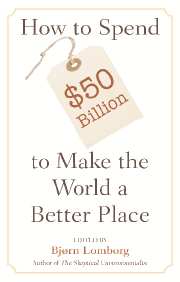Book contents
- Frontmatter
- Contents
- Contributors
- Introduction
- 1 Meeting the Challenge of Global Warming
- CLIMATE CHANGE – OPPONENTS' VIEWS
- 2 Communicable Diseases
- COMMUNICABLE DISEASES – OPPONENTS' VIEWS
- 3 The Challenge of Reducing the Global Incidence of Civil War
- THE CHALLENGE OF CONFLICTS – OPPONENTS' VIEWS
- 4 Toward a New Consensus for Addressing the Global Challenge of the Lack of Education
- THE CHALLENGE OF LACK OF EDUCATION – OPPONENTS' VIEWS
- 5 The Challenge of Poor Governance and Corruption
- THE CHALLENGE OF POOR GOVERNANCE AND CORRUPTION – OPPONENTS' VIEWS
- 6 Hunger and Malnutrition
- HUNGER AND MALNUTRITION – OPPONENTS' VIEWS
- 7 Population and Migration
- POPULATION: MIGRATION – OPPONENTS' VIEWS
- 8 The Water Challenge
- THE WATER CHALLENGE – OPPONENTS' VIEWS
- 9 Subsidies and Trade Barriers
- SUBSIDIES AND TRADE BARRIERS – OPPONENTS' VIEWS
- Expert Panel Ranking
- Index
POPULATION: MIGRATION – OPPONENTS' VIEWS
Published online by Cambridge University Press: 27 July 2009
- Frontmatter
- Contents
- Contributors
- Introduction
- 1 Meeting the Challenge of Global Warming
- CLIMATE CHANGE – OPPONENTS' VIEWS
- 2 Communicable Diseases
- COMMUNICABLE DISEASES – OPPONENTS' VIEWS
- 3 The Challenge of Reducing the Global Incidence of Civil War
- THE CHALLENGE OF CONFLICTS – OPPONENTS' VIEWS
- 4 Toward a New Consensus for Addressing the Global Challenge of the Lack of Education
- THE CHALLENGE OF LACK OF EDUCATION – OPPONENTS' VIEWS
- 5 The Challenge of Poor Governance and Corruption
- THE CHALLENGE OF POOR GOVERNANCE AND CORRUPTION – OPPONENTS' VIEWS
- 6 Hunger and Malnutrition
- HUNGER AND MALNUTRITION – OPPONENTS' VIEWS
- 7 Population and Migration
- POPULATION: MIGRATION – OPPONENTS' VIEWS
- 8 The Water Challenge
- THE WATER CHALLENGE – OPPONENTS' VIEWS
- 9 Subsidies and Trade Barriers
- SUBSIDIES AND TRADE BARRIERS – OPPONENTS' VIEWS
- Expert Panel Ranking
- Index
Summary
Contrasting views of Philip Martin's challenge paper are given in these two opposition papers. Roger Böhning is in broad agreement with the analysis and recommendations, differing mainly on the roles the State must play if the proposals are to work and in believing that a World Migration Organization could play a useful role. Mark Rosenzweig, on the other hand, is quite critical of Martin's analysis. Together, these critiques provide interesting new insights into the challenge presented by migration.
Böhning considers what must be done by the State to make what Martin describes as the “transition from the current widespread employment of irregular workers to a world of legal migrants.” His first point is that labor inspection regimes are at their weakest (essentially non-existent) in the “informal” employment sector, where illegal employment is common. Secondly, he sees a link between illegal migration and corruption, in both the home and receiving countries. Thirdly, since State recruitment of migrants has effectively stopped in most countries, the vacuum has largely been filled by intermediaries supplying illegal workers. All three factors require attention if migration is to be managed properly.
Turning to Martin's proposal to attract skilled workers while compensating the home countries for the brain drain, Böhning sees a good case for selection by educational qualification to be put on European policy agendas, and sees this as far preferable to promoting immigration as a demographic quick fix to the problems presented by an ageing population.
- Type
- Chapter
- Information
- How to Spend $50 Billion to Make the World a Better Place , pp. 125 - 128Publisher: Cambridge University PressPrint publication year: 2006



